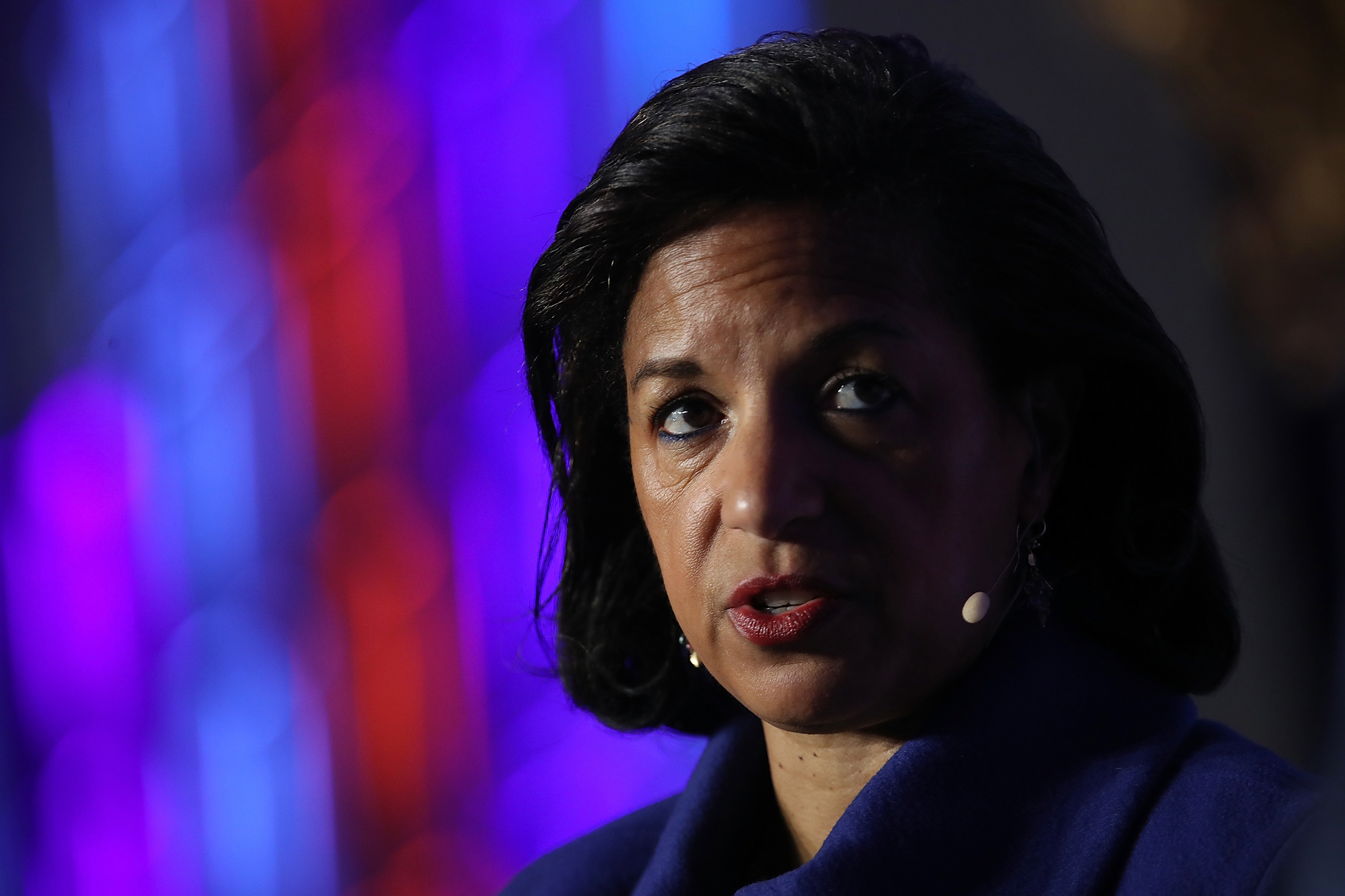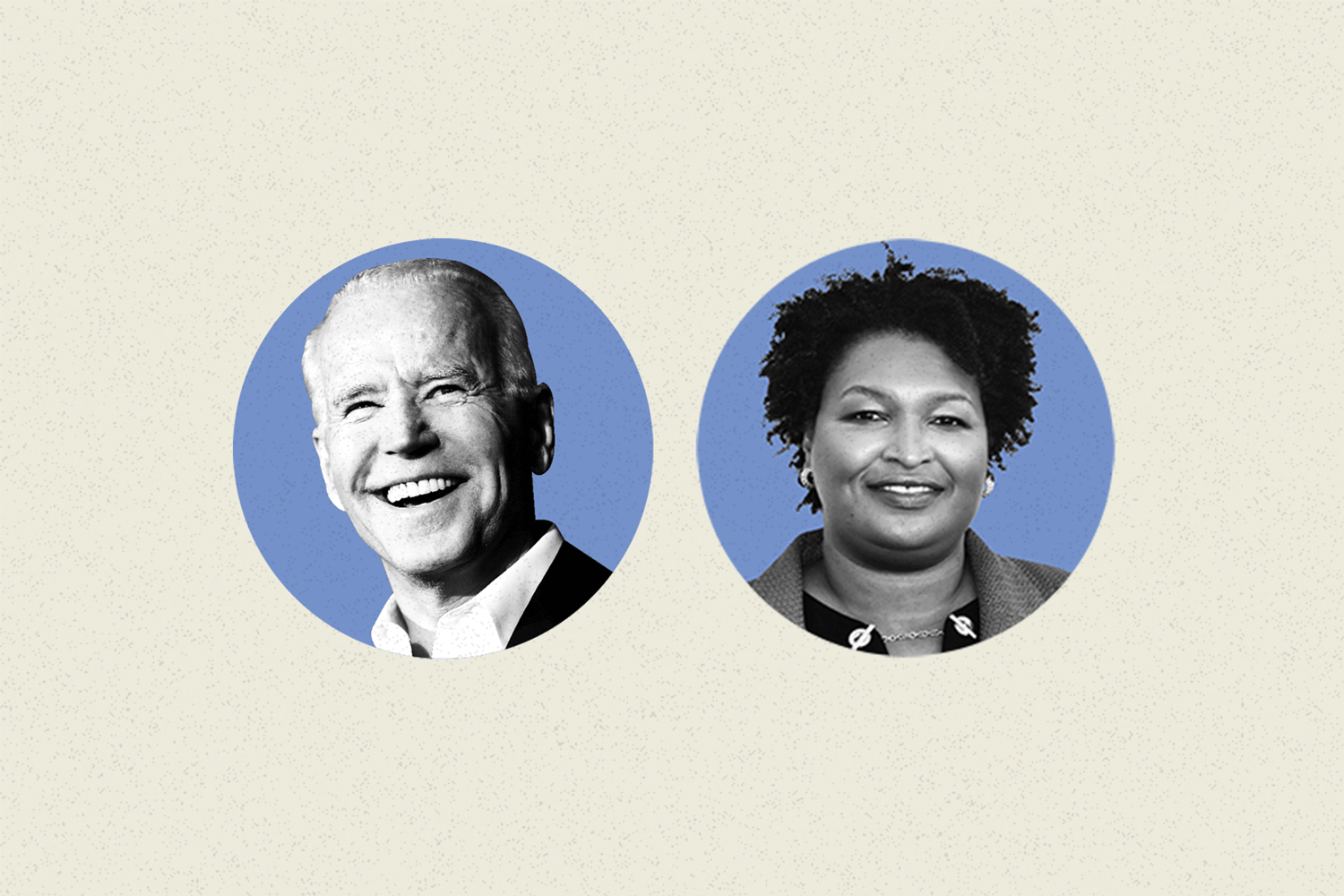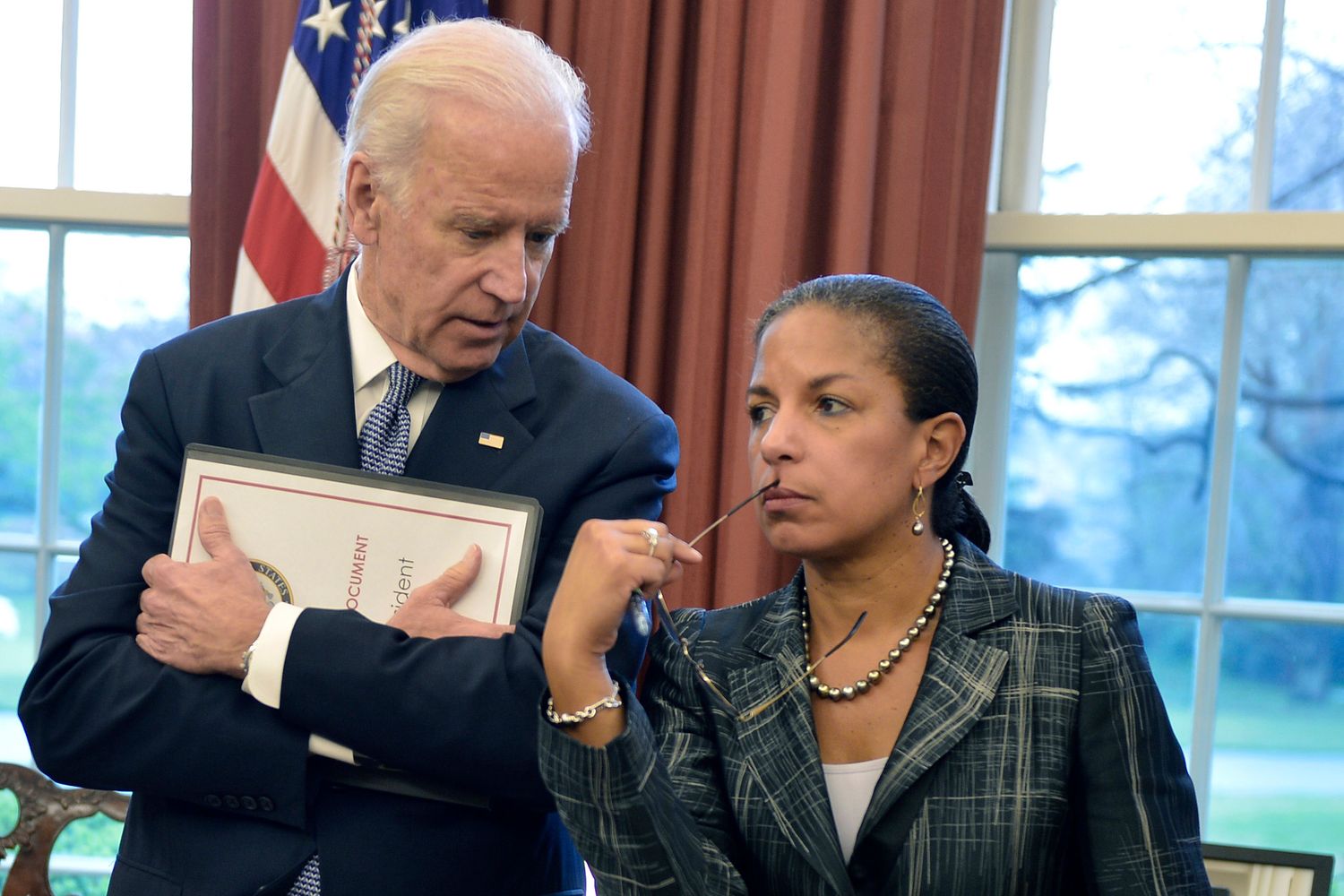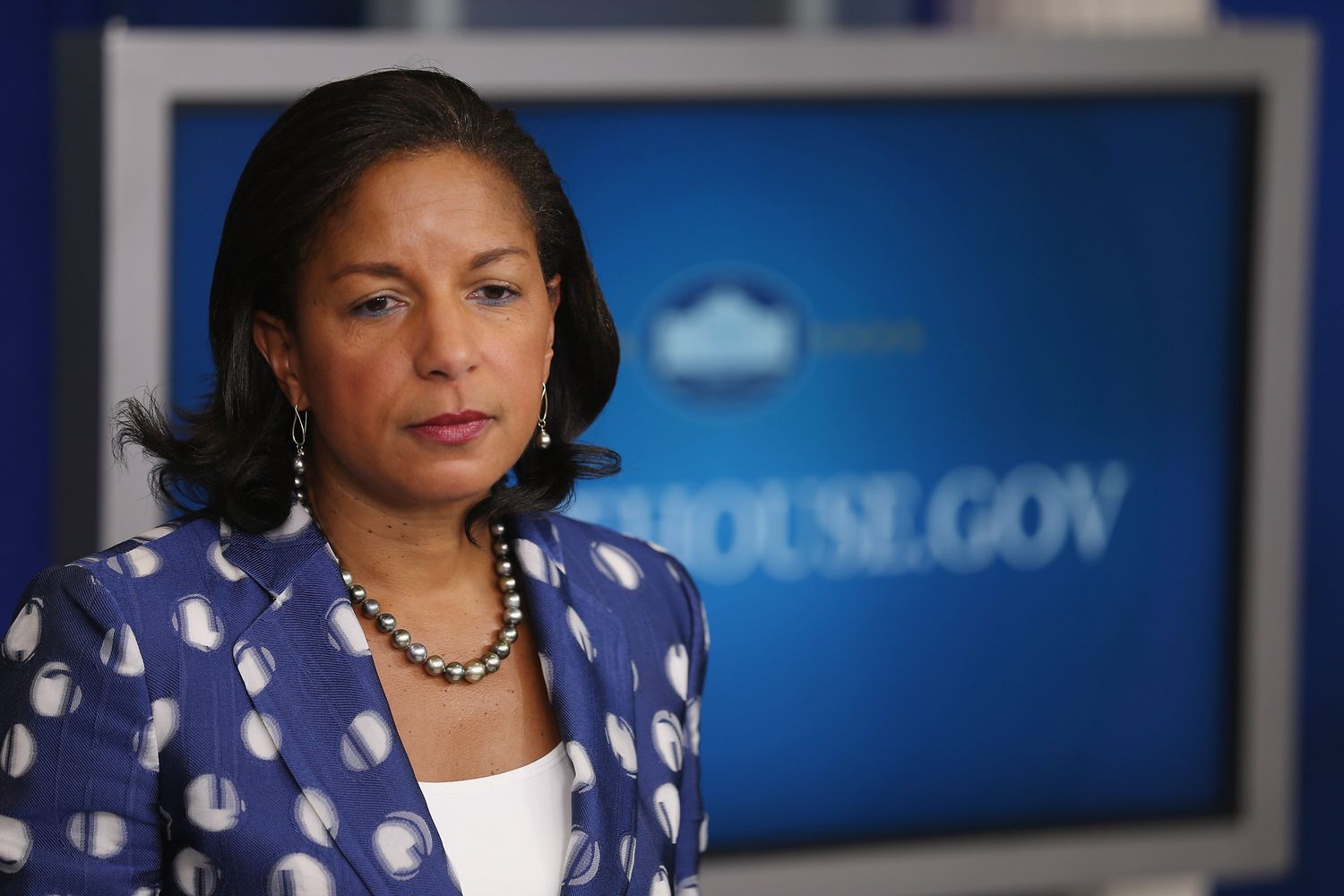
Don’t count Susan Rice out of the vice-presidential contest.
At first glance, it might be easy to dismiss the former national security adviser’s chances of joining Joe Biden on the Democratic ticket. Rice has never run for elected office. She doesn’t bring along the loyalties of a swing state. Her work experience revolves largely around foreign affairs, which could seem redundant given Biden’s experience in those issues. Her son is a proud and active Republican, while the GOP has for years used her as a punching bag over the Benghazi tragedy – the main reason many Americans have ever even heard her name.
But more than a dozen of Rice’s friends and former colleagues recently interviewed by POLITICO dismiss those concerns. They argued that Rice is no stranger to the campaign trail, even if she wasn’t the candidate, and besides, amid the coronavirus pandemic, what campaign trail is there?
They describe Rice as a highly able government operator, the type who can hold the reins on foreign policy as a President Biden tackles the consuming domestic crises of a pandemic and a cratered economy. Having a Republican son speaks to her open-mindedness, these supporters say, further arguing that Benghazi is a spent issue that isn’t likely to swing any votes.
Perhaps most important? Rice has a longstanding — and by all accounts warm — relationship with Biden.
“He has seen her not just in good times but on really hard and challenging occasions,” said Valerie Jarrett, who served as a senior adviser to former President Barack Obama. Jarrett stressed that she’s not endorsing any particular candidate over others, but also said of Rice: “There is a level and depth to her experience which would be a real asset.”
The Biden campaign won’t comment on his potential running mates. But after word leaked that Rice is being vetted, buzz about the possibility has grown, spawning columns with titles like “The Case for Susan Rice.”
The chatter is loud enough that allies of others being eyed for the vice presidency are increasingly worried about Rice, especially because of her close ties to Biden, who, as Obama’s No. 2, had an office just steps away from hers.
Privately, some in California Sen. Kamala Harris’ world have indicated that Rice could be Harris’ most formidable rival for the vice presidential slot. Harris is widely considered the candidate with the best shot at being Biden’s running mate — she went through the press wringer when she ran against him in the primary and has decent name recognition. Like Rice, she would represent the first Black woman on a major-party presidential ticket.

No one rules it out, but there’s less speculation that Rice would run for the Oval Office the way Harris almost certainly would post-Biden. That might give Rice an edge in the veepstakes, especially if Biden — who has hinted he may serve one term — doesn’t want to deal with the distraction of a governing partner eyeing his job.
Still, Rice would be an unorthodox pick. It’s not entirely certain who first suggested her as a potential vice president, although Jim Clyburn, the powerful congressman whose endorsement help deliver South Carolina for Biden, praised Rice and noted in a brief interview that he has promoted her as one of several options. Rep. Cedric Richmond of Louisiana, a Biden campaign co-chair, confirmed that Rice is being vetted and said her consideration as a possible running mate is “absolutely serious.”
Rice has drawn extra attention, too, over the past several months because she released a memoir – the last pages of which come across more like a political call to action than an insider account of Obama’s foreign policy. She’s kept her name in the news with regular television hits and columns in The New York Times, sometimes tackling topics beyond national security, including race relations.
People close to Rice say she did not put herself forward but would be proud to serve if asked. “One of the things she’s most passionate about is public service,” said Gayle Smith, a longtime friend and colleague of Rice’s who led the U.S. Agency for International Development under Obama.
***
Several of the people who spoke to POLITICO worked directly with Rice during her time in the Obama administration, when she served as U.S. ambassador to the United Nations and national security adviser.
Some confessed that they had serious policy differences with her, especially on issues related to Africa, but said that, overall, they respected her. Most spoke of her in glowing terms, even ones who at first were taken aback by her tough standards and liberal use of curse words.
“In the beginning, I thought ‘Who is this crazy person?’ But by the end, I just developed one of the most profound senses of respect I’ve had for anyone in government,” one former National Security Council staffer said. “She got things done. She’s one of the most effective bureaucratic operators I’ve ever seen in government.”
Rice, 55, was the type of boss who valued differing opinions and constantly challenged her aides to pressure-test their arguments, former colleagues said. But they also praised her for deferring to her topic-expert staffers in meetings. She’s also fiercely loyal to and protective of the people who work for her, they said.
Meridith Webster described how, in 2009, after learning her mother had Stage 4 lung cancer, she kept going to work as Rice’s deputy chief of staff at the U.S. Mission to the United Nations, even as she felt “sad and helpless.” Then one day, Rice walked into Webster’s office, shut the door, and told her she needed to go be with her mother.
“She said, ‘Take as much time as you want. When you come back, your job is here. If you don’t go now, you will regret this for the rest of your life,” recalled Webster, who took a leave of absence. “If she hadn’t told me to do that, I don’t think I would have known to do it. It allowed me to have the end with my mother. It ended in a way that I have closure. Because of Susan, I don’t have regrets about this horrible time.”
In her book, titled “Tough Love,” Rice makes relatively few mentions of Biden, but when she does describe him it’s in friendly terms. She mentions how, in the 1990s, then-Senator Biden spoke in her favor as the Senate considered, and eventually confirmed, her for the role of assistant secretary of State for African affairs.
“My favorite unannounced visitor was Joe Biden, whose office was just down the hall,” Rice wrote of her later years in the White House. “He came to check on how we were doing, buck us up, tell a joke, shoot the breeze, or deliver a Bidenism — a family aphorism that never lost its value.”
“In rare instances,” she added, “the vice president surprised me by baring his soul, sharing his agony over his son Beau’s cancer and later his tragic passing. Even when in pain, Joe Biden was warm and generous, always leaving me feeling better than when he walked in.”
Rice briefed Biden and Obama on national security issues on a regular basis. “Biden obviously had his own national security staff, but she spent as much time with him as just about anyone not directly on his staff,” a second former NSC official said.
Biden and Rice did not always on agree on policy. As the Arab Spring revolutions rocked the Middle East in 2011, Biden urged Obama not to abandon Egyptian dictator Hosni Mubarak, a man he’d long known. Rice sided with the protesters who wanted Mubarak gone. Her side won that argument.
Rice, who was Obama’s U.N. ambassador at the time, favored U.S. intervention in Libya to stop dictator Moammar Gadhafi from wiping out the residents of the city of Benghazi, a rebel stronghold. Rice, who had been an NSC staffer when the Rwandan genocide occurred, was determined to prevent another mass atrocity. But Biden and others argued against intervention, saying the U.S. had no compelling national security interests in Libya.
The eventual U.S.-led intervention may have prevented mass killings in Benghazi. But it quickly morphed into a broader battle against Gadhafi, who ultimately was overthrown and killed. Libya today is a broken, violent country of competing militias with several foreign powers stoking the conflict.

***
For Rice, Libya also is a sore spot for another reason. She devotes a full chapter to discussing how the violent deaths of four Americans in Benghazi — at a poorly secured outpost in a shattered country they little understood — became a political drama in which Republicans cast her as a main villain.
Days after the 2012 attacks, which killed the U.S. ambassador to Libya, Rice appeared on the Sunday shows to defend the administration’s response. Republicans decried her comments as deliberately misleading; Rice maintains that she adhered to talking points given to her by intelligence officials based on their best information at the time — some of which later turned out to be incorrect.
But with a presidential election looming, Republicans were in no mood to be charitable — and the episode likely derailed Rice’s hopes of succeeding Hillary Clinton as secretary of State. She instead became national security adviser, a position that does not require Senate confirmation, during Obama’s second term.
Rice is no stranger to the pugilistic nature of U.S. politics: She served as an outside adviser to Howard Dean during the 2004 Democratic primary because he’d opposed the Iraq war. She then joined John Kerry’s campaign because she wanted badly to oust George W. Bush. She linked up with Obama’s first White House campaign early, serving as a public surrogate and helping with fundraising, speeches, debate prep, and, of course, the development of his foreign policy.
But Rice writes that she was taken aback at how the Benghazi-related attacks on her escalated even after Obama was reelected. The toll on her family was intense.
Her 8-year-old daughter, Maris, began complaining of having hallucinations. According to Rice’s book, Maris would see people, usually a man, coming at her, sometimes out of the walls, and talking. The episodes lasted roughly a year. After ruling out other reasons, Rice writes, “doctors concluded that Maris was experiencing a stress reaction to watching her mother being assailed for my role in characterizing the Benghazi attack.”
Amid the cacophony, Rice took herself out of the running for secretary of State, but she also took the time to investigate how she could have handled things differently. She concluded that during her Sunday television appearances, there were “some words and phrases” that she wished she could “restate with more precision, less certitude, or not have said at all,” although she insists none materially changed the substance of her comments. She also decided she needed to cultivate better ties with members of Congress and the press.
Donald Trump’s presidency has drawn Rice into another maelstrom: Republicans accuse her of wrongdoing for seeking the identities of some Americans referenced in intelligence reports who turned out to be Trump associates. Rice says she did nothing wrong in seeking their names – a process known as “unmasking” – and that she did so as a routine part of her job as national security adviser.
Rice’s supporters for the most part dismiss the idea that either the Benghazi or unmasking claims could hobble a Biden-Rice ticket. They say they are worn-out, unsubstantiated allegations that will mean little to most American voters far more worried about the economy, the pandemic and other challenges.
The allegations certainly have not made Rice gun shy.
Whether on social media or other platforms, Rice is a salt-tongued critic of Trump and other Republicans who support him. She called South Carolina Sen. Lindsey Graham, one of her chief Benghazi and unmasking tormenters, a “piece of s***” on a popular podcast last year. Over the weekend, when Trump backed out of an upcoming appearance at a Yankees game, she tweeted out a photo of herself throwing the first pitch at Nationals Park in 2013, along with the cheeky comment, “What’s the matter, Mr. President? Can’t get it up and over the plate?”
In the Benghazi chapter, Rice also describes her deep disappointment in how Republican Sen. Susan Collins of Maine – a state where Rice has strong family ties – publicly criticized her in ways Rice saw as disingenuous. In 2018, Rice hinted that she might run against Collins for the Senate.
She chose not to, however. She said the timing wasn’t great for her family; they would have had to move to Maine full-time just as Maris was entering her junior year of high school in Washington.

Rice herself grew up in Washington in a relatively well-off family that prized education. Her father, Emmett Rice, served on the Board of the Governors of the Federal Reserve System. Her mother Lois Dickson Rice’s achievements included helping establish the Federal Pell Grant program. Her parents’ marriage was bitter, though, ending in divorce, and Rice recalls trying to mediate their disputes — an early lesson in diplomacy.
Rice’s son, Jake, is one of the most fascinating characters in her life. She describes him as an independent thinker and avid birder whose politics have swung from left to right for reasons that remain unclear to her and her husband, the former ABC News executive producer Ian Cameron. He led the College Republicans at Stanford — his mother’s alma mater as well — even pushing to “Make Stanford Great Again,” according to various media reports.
Rice stresses that she gets along very well with her son, but, in her book she admits that “it can be deeply painful to love someone so powerfully with whom I disagree so profoundly.”
***
On the left, Rice inspires mixed feelings.
She makes clear in her book that she has plenty of views on domestic policy, even if that’s not been her primary professional focus. "I favor pragmatic progressive solutions,” she writes, rattling off a set of views that place her well within the Democratic mainstream. She’s pro-choice, believes the state has an important role to play and is “deeply committed to ensuring that quality health care is accessible to all.” Climate change, she adds, “is an urgent, existential threat.”
Progressives like her because she’s a woman, and a woman of color, with plenty of policy chops and experience, and one whose fervor to defeat Trump matches their own. But privately, they say, her support for some Obama-era moves, including what became an extended military intervention in Libya that went beyond preventing an atrocity, makes some queasy.
Rice also has long faced criticisms about her track record on African issues.
She’s been accused of going too easy on some African leaders, especially Rwandan autocrat Paul Kagame. Her supporters, however, dismiss what they describe as simplistic criticisms, and they say she was far tougher on people like Kagame in private than many observers may realize.
Rice also faced criticism for taking too long to agree to pursue a U.N. arms embargo on South Sudan; that didn’t go through until during the Trump administration, which has taken a more hard-edged approach to some aspects of Africa policy.
In her book, Rice delves deep into her time dealing with a vast range of Africa policy issues, including when she was assistant secretary of State for the continent. She defends her reasoning in various situations in terms of U.S. national interest as well as ground realities, but admits her calculations weren’t always perfect.
For instance, she says she was wrong to believe that by not supporting an embargo the U.S. could retain enough leverage over the South Sudanese government to mitigate its behavior as it fought rebels in a vicious civil war.
“Perhaps out of personal history, unrealistic hopes for the people of South Sudan, and an overestimation of U.S. influence, I was too slow to conclude that neither side had the will to end the conflict nor agree to a unity government,” she writes.
A former U.S. official said one concern of some who served with Rice and Biden in the past is that so many of the people around them are the same people who ran the White House before Trump. The question is whether they learned from their past errors, this person said.
“I would just hope that they could have the openness to see both their mistakes in the past and that this is now 2021,” the former official said. “This is not 2008, and it’s not Obama II, even. The world has changed, and our policy should evolve.”
In her recent writings, Rice indicates she’s well aware of the broader challenges facing the United States years after she last worked in the White House. In her columns, she’s tackled political issues beyond national security, including arguing in favor of statehood for Washington, D.C., and saying the pandemic shows Americans must rise above their differences.
“To recover from this crisis, it will not suffice to contain the carnage, reopen our economy and ‘get back to normal.’ she wrote in April. “’Normal’ is too costly and deadly for all Americans.”
The final pages of her book read a bit like a campaign speech. She lays out some ideas for promoting societal unity, saying, for instance, that “one year of mandatory national service would compel Americans to get to know each other and work together.”
She also writes that she’s “fundamentally optimistic about America.”
“No one has ever won by betting against America’s long-term capacity for growth, change, and renewal.”
John Bresnahan contributed to this report.
Source: politico.com
See more here: news365.stream






